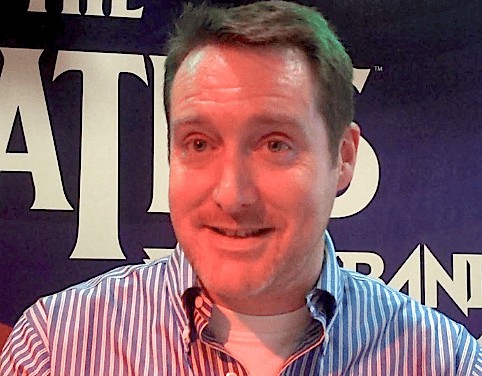
Music games sales’ tempo may be slowing – but that’s only because instrument ownership is nearing saturation – and anyway, songs bought within titles like Rock Band and Guitar Hero are flying off virtual shelves, MTV’s games SVP Paul DeGooyer told me at the Midem music conference.
“Certainly, music games have cooled substantially,” DeGooyer, who manages MTV’s Harmonix-produced Rock Band franchise, acknowledged. “But it’s not as steep a decline as you might think.
“What’s encouraging for us is that most of those sales were software, meaning people who have Rock Band or Guitar Hero guitars are using those instruments to play a new game.” Volumes are fine but revenues are worsening because “the majority of people are buying software-priced units”: “That’s a pretty critical piece of the business, going forward.”
MTV’s The Beatles: Rock Band has sold 1.7 million copies since September, but overall sales of the segment’s top two titles halved to $224 million in 2009, according to Wedbush Morgan (via WSJ). But DeGooyer, in an earlier panel session, said “decline” is a double-edged sword: Whilst that’s happened on the physical sales side, the download side continues to grow for us.” Though Rock Band‘s various incarnations have shipped about 200 songs on their shiny discs, over 1,000 are now available to buy in-game – they’ve clocked up 60 million paying downloads in the last two years.
But the in-game success doesn’t mean MTV isn’t looking for the next big music game interface innovation. “The major theme is: what’s next?,” DeGooyer said. “Songs and music games need to be a part of people’s self-expression. Developments in terms of console interfaces are going to make it, literally, more gestural to interact with music.”
He stressed the need to replicate music’s social currency within the games, drawing parallels with ringtones. But key is arresting the falling game instrument sales by developing new instruments with mass appeal. “The challenge for us in the space is … music fans overall would love to interact with music in this way but may not be able to get over the plastic instrument. The category needs to break out of that core constituency and go beyond that.”
In-game purchases may be increasingly crucial to the music game genre, and could give a fillip to a music biz that’s seeing desktop download sales slowing – “It feels closer than ever that there is a true music business 2.0,” DeGooyer said. But they depend on good relations with music labels and not everyone’s happy with the genre’s rise. Warner Music Group (NYSE: WMG) CEO Edgar Bronfman Jr complained last year “we will not license to those games” if “paltry” royalties don’t increase.
“I completely understand where they’re coming from,” MTV’s DeGooyer said. “They’re looking at a business that’s generating more than a billion dollars in retail revenue.” But, claiming a “very close relationship” with the label, he cites a new Rock Band tie-up with Warner’s Green Day that, presumably, was inked before WMG’s got frosty: “I don’t think people have really noticed that there haven’t been new licenses coming out. It has not been much of an issue for us.”
Perhaps to reduce dependence on label deals, MTV has unveiled Rock Band Network, a scheme allowing independents to upload their own songs that can then be purchased for game players. The programme bears strong resemblance to how players create and submit levels to PS3 game Little Big Planet and is currently beta-testing 150 submissions.